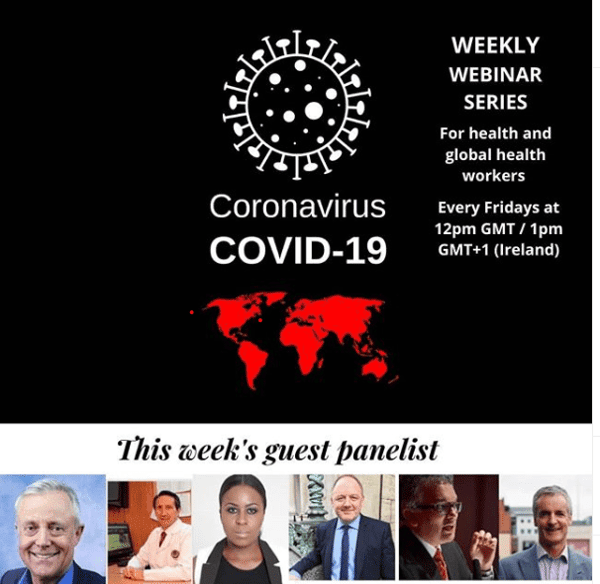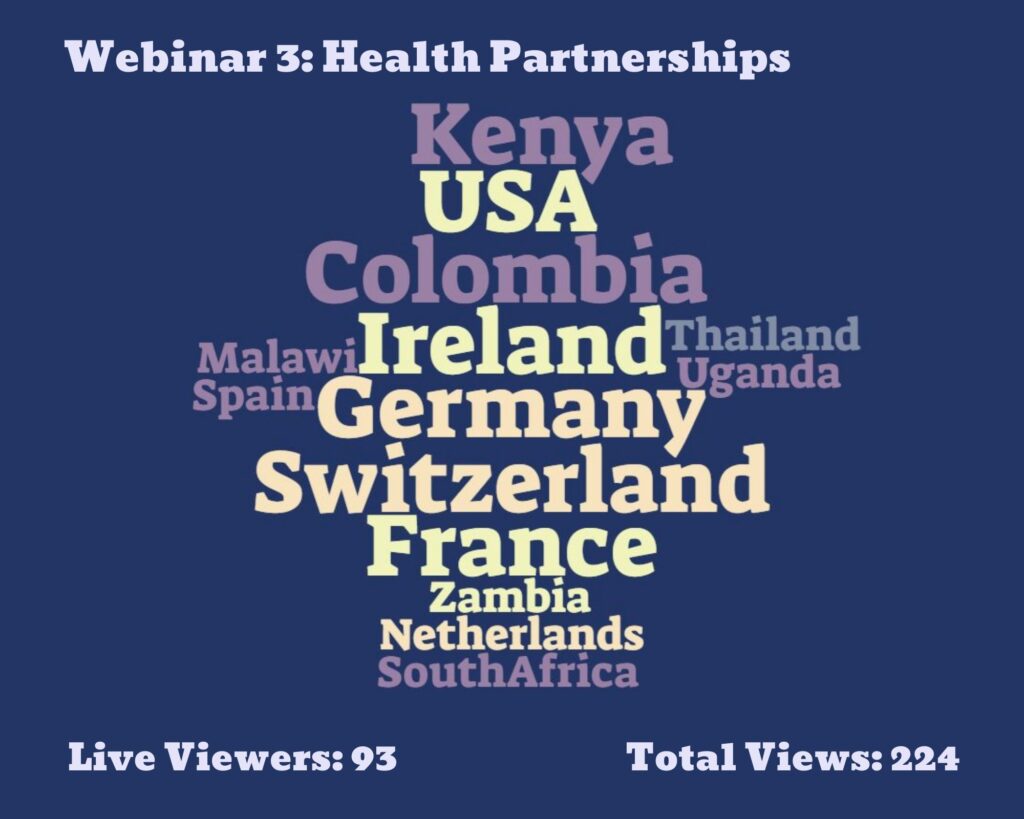Conversations on COVID-19 3rd Webinar: North-South Health Partnerships in the context of COVID-19: How to best respond
 WEBINAR SERIES: WEEK THREE North-South Health Partnerships in the context of COVID-19: How to best respond
WEBINAR SERIES: WEEK THREE North-South Health Partnerships in the context of COVID-19: How to best respond
The third webinar was held on Friday 03/04/2020 at 12:00 pm GMT/1PM Irish Time.
VIEW THE WEBINARWEBINAR EVALUATION
A SUMMARY OF POINTS MADE
David Weakliam of HSE: leader and advocate on global health issues in Ireland.
Maintaining commitment and solidarity with partners in their time of greatest need is crucial. Partnerships can assist in identifying which program aspects can continue, which need to be suspended, what different activities can we undertake that is of help to our LMIC partners.
Don’t press on with timelines- be flexible with partnerships and adapt to partner needs. Partnerships need to be a source of support and collaboration for teams on the ground. E.g. Packaging information for immediate needs such as helping to tailor information for their specific context.
Need to support LMICs, especially when there is intense preoccupation within our own countries; those in high-income countries must support LMICs – everyone has a role to play in advocacy towards a truly global response.
Dr. Shams Syed: coordinates the WHO Quality Systems and Resilience Unit, currently directly oversees the WHO national quality policy and strategy initiative
Partnerships have a pragmatic role, and this must be directly relevant to the LMIC partner. This can be achieved through technical exchange, learning for action, and solidarity through compassion for each other. Partnerships are well placed because they know the practicalities and priorities of the work on the front line and can provide that support.
Partnerships can assist in ensuring that care is effective, safe and patient centred: however, people must also want to access services provided.
Partnerships keep us grounded in ensuring that guidance is being implemented operationally on the ground.
Strong emphasis must be placed on maintaining essential health services and priorities need to be set in the short, medium and long terms, ensuring that by the recovery phase, we can build back better.
Dr. Ben Simms of THET: an organisation that is pioneering a health partnership approach to the training of health workers across 30 countries in Africa and Asia.
Maintaining communication is crucial within partnerships. The best way of supporting LMICs is with clinical expertise and solidarity. Mental health impacts on healthcare workers will be immense due to stress and pressure and partnerships have a role in expressing solidarity and support.
There are corporates and members of parliament in the UK who are concerned with the epidemic affecting LMICs; long-term partnerships are the best means of getting funding on the ground.
Unprecedented levels of solidarity and generosity are needed and there needs to be a movement for a greater assistance for LMICs both medically and economically.
Dr. Mwenya Kasonde, emergency medicine physician; served as Assistant Director for Global Health at the Ministry of Health in Zambia
Zambia (at time of recording): 39 cases recorded, 1 death reported.Testing and reporting in Africa has been slow, so reporting of the number of cases may be slow or inaccurate.
Health ministry in Zambia has been proactive with commendable leadership, coming together with multi-sectoral and multi-stakeholder approach, strong communication to public.
Academic partnerships are crucial at this time to ensure that all systems come out of this stronger. This needs to be shared between North-South partnerships as this is a rich environment for growth. This is an opportunity to improve health systems, rather than simply to return to “normal”.
What we do as leaders affects how people react at grassroots level, especially with health seeking behaviours.
Dr. Arley Gomez Lopez.MD;MSc;PhD, Research Director at Fundación Universitaria de Ciencias de la Salud
Communication is a very important tool for institutional strengthening and governments require expertise to help them to make larger decisions for countries’ health.
Columbia is cooperating with the Cooperation Institute in Switzerland who have advised the Colombian Government on healthcare system strengthening and control measures.
Research partnerships are important in highlighting the importance of learning and information sharing. Examples included universities working towards creating new devices, public health measures and intelligence networks.
Worldwide collaboration and coordination is important – moving towards a shared goal.
Webinar ANCHOR:
Prof Ruairi Brugha, MB, BCh, BAO, MD, FFPHMI, MSc, DCH, Dip Obs, Dip Humanities
View his COVID-19 Stats contribution here
Download Ruairi’s Powerpoint Presentation
Ashley Scott, IGHN Key Correspondent, In-depth Webinar Summary 3

CATEGORIES
- Restore Humanity Campaign
- Equity in Action Blog
- Training Programmes
- Sponsorship
- Vaccine Equity
- Get Global – Global Health Talks
- Student Outreach Team
- Get Global Young Professionals Talk Global Health
- Global Health Matters – Live Event Series
- Global Health Matters – IGHN Live Event Series
- An initiative of Irish Global Health Network
- ESTHER Ireland and ESTHER Alliance for Global Health Partnerships
- Global Health Matters – Webinar Series
- ESTHER
- IGHN Conferences
- Global Health Conference 2020
- Women in Global Health – Ireland Chapter
- ESTHER Partnerships
- Weekly Webinar Series
- 4th Global Forum on HRH
- Access to Medicines
- Archive Page Weekly COVID Webinars
- Clean Cooking 2019
- Climate Change and Health Conference 2017
- Conference Abstracts
- Conference Materials
- Covid FAQ
- COVID Funding Opportunities
- COVID-19
- COVID-19: Gender Resources
- Dashboard and online resources
- Education
- ESTHER Alliance
- Events
- Events & News
- Funding covid
- Global Health Exchange 2018
- Global Health Exchange 2019
- Global Health symposium 2019
- Health Workforce/HRH
- Homepage Featured
- Homepage recent posts
- IFGH 2011-2012 Conference and Events
- IFGH 2014 Conference
- IFGH Multimedia
- Irish AIDS Day 2017
- Irish News and Feeds
- Key Correspondent Articles
- Key Correspondent News
- Maternal Health
- Multimedia
- News
- News & Events
- Newsletter
- Opportunity
- Our LMIC's Resources for COVID19
- Partner Country News and Feeds
- Past Events
- Policy
- Presentations
- Recurring events
- Reports & Publications
- Research
- Resources
- Student Outreach Group
- Students Corner
- TEDTalks
- TRAINING COURSES FOR HEALTH CARE PROFESSIONALS
- Uncategorized
- Upcoming Events
RECENT POSTS

Impact testimonies- Lombani

Impact Testimony – Shadrick

Power, Inequality, Decolonisation – and Living My Recovery By Bronwyn April

Global Health Without Borders: Reflections on the Power of Diverse Voices

IGHNxEU – Empowering Women for a Healthier Europe

